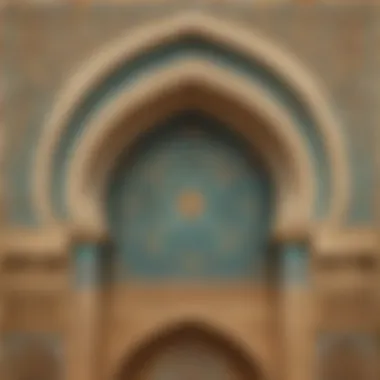Unlocking the Mysteries of the Islamic Calendar: A Deep Dive into Each Month's Significance


Interactive Learning Games
Indulge in a realm of interactive learning games that cater to the inquisitive minds of children, parents, teachers, and caregivers. Explore a plethora of popular educational games designed to stimulate cognitive development. Dive into detailed descriptions of top-rated educational games, unraveling the benefits they offer for children's holistic growth and learning journey. Delve into immersive game reviews that provide insights into gameplay dynamics and the educational outcomes they yield.
Educational Topics
Embark on a journey through a compilation of informative articles, spanning diverse subjects such as mathematics, science, languages, and more. Discover the significace of interdisciplinary learning, fostering a well-rounded educational experience that nurtures holistic development.
Tips and Tricks
Navigate through practical tips meticulously crafted for parents and educators, aimed at enhancing children's learning endeavors. Uncover effective strategies that inject fun and engagement into the learning process, creating an enriching educational environment.
Creative DIY Projects
Encounter a host of creative DIY projects tailored to ignite children's creativity and imagination. Unravel detailed instructions guiding you through hands-on activities that not only promote cognitive and motor skills but also spark innovation and artistic expression.
Step-by-Step Guides
Take a deep dive into elaborate, step-by-step guides meticulously curated for engaging DIY projects. Unveil the myriad benefits of hands-on activities that bolster children's cognitive faculties and enhance their motor skills, fostering a well-rounded developmental journey.


Craft Ideas
Explore a collection of imaginative craft ideas utilizing everyday household items, nurturing children's artistic flair. Understand the pivotal role artistic expression plays in children's development, fostering creativity and instilling a sense of achievement and self-expression.
Introduction to the Islamic Calendar
In this section, we embark on a profound journey delving into the Islamic calendar's essence and significance. The Islamic calendar, also known as the Hijri calendar, operates on a lunar-based system, marking time differently from the Gregorian calendar. Exploring this unique timekeeping system provides us with an enriched understanding of Islamic culture and traditions.
Lunar-Based System
Origin and Basis
Diving into the origins of the Hijri calendar, we unravel its fundamental basis on the cycles of the moon. The Islamic calendar's inception dates back to the time of Prophet Muhammad, establishing a system that reflects the lunar phases. This system holds intrinsic cultural and religious value, guiding various practices and observances in the Islamic faith. Although lesser-known globally, the lunar-based system offers a distinct perspective on time measurement, emphasizing natural rhythms over standardized intervals.
Comparison with Gregorian Calendar
Contrasting the Islamic calendar with the widely adopted Gregorian calendar sheds light on their divergent principles. While the Gregorian calendar follows a solar-based model with 365 days in a year, the Islamic calendar's lunar structure comprises 354 or 355 days. This variance leads to variations in the commencement of months and significant dates across the two systems. Despite the Gregorian calendar's global predominance, the lunar-based Hijri calendar maintains its cultural and religious relevance, serving as a cornerstone of Islamic practices.
Importance of the Islamic Calendar


The Islamic calendar holds profound cultural and religious significance, shaping the lives of millions worldwide.
Cultural Significance
Central to Muslim communities, the Hijri calendar carries cultural weight through its connection to historic events, festivities, and social gatherings. Each month bears unique characteristics and communal traditions, fostering a sense of spiritual unity among believers. This cultural dimension reinforces Islamic identity and fosters a shared heritage among diverse Islamic societies.
Religious Observances
The Islamic calendar's importance is underscored by its role in facilitating religious observances and rituals. Muslim festivals and fasts are intricately linked to the lunar months, marking essential dates such as Ramadan and Hajj. This alignment with the Hijri calendar imbues religious practices with a cyclical and celestial quality, enhancing the spiritual significance of these observances. The calendar serves as a spiritual compass, guiding the faithful through key religious milestones and fostering a deeper connection to Islamic principles.
The Twelve Months of the Islamic Calendar
In delving into the essence of The Twelve Months of the Islamic Calendar, we embark on a journey of cultural and historical significance. These months not only mark the passage of time but also hold deep-rooted meaning within Islamic traditions. As we traverse through each month, unique insights into the religious and cultural fabric of Islam unfold. Understanding the importance of each month allows us to grasp the diverse tapestry that forms the Islamic calendar, offering a glimpse into the rich customs and observances embedded within.
Muharram
Meaning and Significance
Muharram, the first month of the Islamic calendar, carries profound significance within Islamic history. Known as a time of remembrance and reflection, Muharram symbolizes the beginning of the Islamic year and holds a contemplative spirit. The commemoration of the martyrdom of Imam Hussain, the grandson of Prophet Muhammad, is central to Muharram, underscoring themes of sacrifice and resilience. This pivotal event underscores the importance of standing against injustice and upholding principles of righteousness, resonating deeply within the hearts of believers.


Historical Events
The historical events intertwined with Muharram encapsulate pivotal moments in Islamic history. From the Battle of Karbala to the sacrifices made by Imam Hussain and his companions, Muharram serves as a reminder of steadfastness in the face of adversity. By commemorating these events, Muslims honor the values of courage, compassion, and devotion to faith. Each retelling of history during this month reinforces the importance of upholding truth and justice, inspiring individuals to embody the virtues exemplified by the revered figures of Islamic history.
Safar
Cultural Practices
Safar, the second month of the Islamic calendar, brings forth a tapestry of cultural practices that have been passed down through generations. From traditional ceremonies to communal gatherings, Safar is a time where customs carry immense significance. The observance of specific rituals during Safar sheds light on the interconnectedness of culture and faith, emphasizing the importance of heritage in shaping communities.
Mythological Beliefs
Within Safar, mythological beliefs intertwine with everyday practices, offering a lens into the spiritual folklore that pervades Islamic culture. Mythical narratives and legends that have been woven into Safar's fabric serve as a means of conveying moral lessons and cultural identity. These beliefs, whether rooted in symbolism or folklore, add layers of depth to the understanding of Safar, making it a month filled with stories of wisdom and metaphorical significance.
Rabi' al-Awwal
Birth of the Prophet Muhammad
Rabi' al-Awwal heralds the birth of the Prophet Muhammad, commemorating a momentous event in Islamic history. This month is a time for celebration and reflection on the life and teachings of the Prophet, serving as a beacon of guidance for Muslims worldwide. The birth of the Prophet Muhammad stands as a testament to divine mercy and prophetic mission, shaping the worldview and practices of believers across the globe.
Commemorative Practices
Commemorative practices during Rabi' al-Awwal manifest in diverse forms, ranging from recitations of poetry to charitable acts inspired by the Prophet's teachings. As Muslims reflect on the Prophet's life and character, they seek to emulate his virtues of compassion, justice, and humility. Commemorative practices serve as a bridge between the past and present, fostering a sense of connection to the prophetic legacy that defines Islamic culture and ethos.
Each section significantly contributes to the holistic unfoldment of the intricate tapestry of the Islamic calendar, offering readers a vivid panorama of cultural, historical, and religious dimensions to ponder upon.















